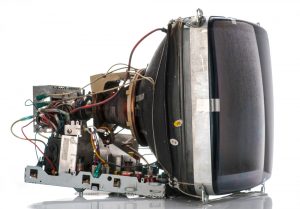 A recently released export tracking study from the Basel Action Network found that roughly one-third of low-value devices dropped off for recycling in the U.S. ended up outside the country.
A recently released export tracking study from the Basel Action Network found that roughly one-third of low-value devices dropped off for recycling in the U.S. ended up outside the country.

 A recently released export tracking study from the Basel Action Network found that roughly one-third of low-value devices dropped off for recycling in the U.S. ended up outside the country.
A recently released export tracking study from the Basel Action Network found that roughly one-third of low-value devices dropped off for recycling in the U.S. ended up outside the country.
 Product lightweighting is preventing manufacturers from increasing e-scrap collection volumes in Canada’s most populous province.
Product lightweighting is preventing manufacturers from increasing e-scrap collection volumes in Canada’s most populous province.
 A recycling company in upstate New York has been targeted by state officials over allegations of mishandling materials.
A recycling company in upstate New York has been targeted by state officials over allegations of mishandling materials.
 Samsung begins selling refurbished phones, and the Zika virus is affecting exports.
Samsung begins selling refurbished phones, and the Zika virus is affecting exports.
 CalRecycle makes changes to its e-scrap management program, and why TV manufacturers should consider repair over replacement.
CalRecycle makes changes to its e-scrap management program, and why TV manufacturers should consider repair over replacement.
 A Chicago suburb makes changes to its e-scrap recycling program, and federal prison funding is affecting electronics recycling in New Mexico.
A Chicago suburb makes changes to its e-scrap recycling program, and federal prison funding is affecting electronics recycling in New Mexico.
 The federal government finalized rules affecting reporting of CRT exports, and a funding dispute between a processor and California leaves students out in the cold.
The federal government finalized rules affecting reporting of CRT exports, and a funding dispute between a processor and California leaves students out in the cold.
 A Midwest electronics recycling executive lied to clients to generate large sums of money and used company funds for gambling and other personal expenses, according to court documents.
A Midwest electronics recycling executive lied to clients to generate large sums of money and used company funds for gambling and other personal expenses, according to court documents.
 A stockpile of CRT glass in the Midwest has caught the attention of the U.S. EPA and led state regulators to suspend an e-scrap company’s license to accept the material.
A stockpile of CRT glass in the Midwest has caught the attention of the U.S. EPA and led state regulators to suspend an e-scrap company’s license to accept the material.
 Greenpeace targets smartphones in a new report, and a workplace chemical exposure rule may be delayed due to a White House directive.
Greenpeace targets smartphones in a new report, and a workplace chemical exposure rule may be delayed due to a White House directive.
